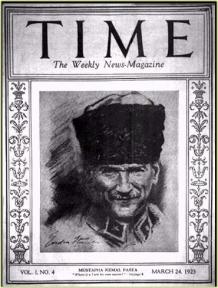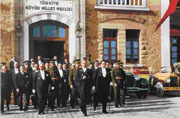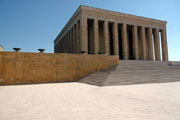Ataturk`s Political life
Post war life and reforms
Kemal Pasha spent the next several years consolidating his control over Turkey and instituting a variety of wide-ranging political, economic and social reforms. These reforms caused some opposition in the Republican People's Party which was founded by Mustafa Kemal in September 9th 1923. Then Mustafa Kemal directed General KazД±m Karabekir to establish the Progressive Republican Party for opposition in Turkish National Assembly. This party opposed state socialism of the Republican People's Party and suggested liberalism. But after some time, the new party was taken over by people Ataturk considered fundamentalists. In 1925, partly in response to the provocations of Sheikh Said, the Maintenance of Order Law was passed, giving Ataturk the authority to shut down subversive groups. The Republican People's Party was quickly disestablished under the new law, an act seen by some as necessary for preserving the Turkish state, but seen by others as the act of a dictator.
On August 11th, 1930 Mustafa Kemal decided to try a democratic movement once again. He charged Ali Fethi Okyar with establishing a new party. In Mustafa Kemal's letter to Ali Fethi Okyar, laicism was insisted on. At first, the brand new Liberal Republican Party succeeded all around the country. But once again the opposition party became too strong in its opposition to AtatГјrk's reforms, particularly in regard to the role of religion in public life. Finally Ali Fethi Okyar abolished his own party and Mustafa Kemal never succeeded in democratising the parliamentary system.
Cultural reform
Mustafa Kemal regarded the fez (which Sultan Mahmud II had originally introduced to the Ottoman Empire's dress code in 1826) as a symbol of feudalism and banned it, encouraging Turkish men to wear European attire. The hijab (scarf which covers the head) for women, while never formally banned, was strongly discouraged; and women were encouraged to wear western apparel and enter the country's workforce. From 1926, the Islamic calendar was replaced with the Gregorian calendar. In 1928 the government decreed that the Arabic script be replaced by a modified Latin alphabet, and citizens between the ages of six and forty were required to attend school and learn the new alphabet. The conservative clergy fiercely opposed these reforms, trying in vain to maintain its traditionally strong influence. As a result of the reforms literacy increased dramatically. The reforms also included extensive removal of Arabic and Persian words from the Turkish language.Mustafa Kemal opened new schools, where, as part of the curriculum, fine arts were taught to boys as well as girls. Girls had traditionally been excluded entirely from education, compulsory primary education was introduced for children of both sexes.
He also encouraged domestic production of alcoholic beverages and established state-owned spirits industry. Mustafa Kemal had an appreciation for the national liquor, rakД±, and consumed vast quantities of it.
Women's rights
With abiding faith in the vital importance of women in society, AtatГјrk launched many reforms to give Turkish women equal rights and opportunities. The new Civil Code, adopted in 1927, abolished polygamy and recognized the equal rights of women in divorce, custody, and inheritance. The entire educational system from the grade school to the university became coeducational. AtatГјrk greatly admired the support that the national liberation struggle received from women and praised their many contributions: "In Turkish society, women have not lagged behind men in science, scholarship, and culture. Perhaps they have even gone further ahead." He gave women the same opportunities as men, including full political rights. In the mid-1930s, 18 women, among them a villager, were elected to the national parliament. Later, Turkey had the world's first female Supreme Court justice.
In 1934 he promulgated a law requiring all Turks to adopt surnames. The Grand National Assembly gave him the deferential name AtatГјrk, meaning "Father of Turks," and assumption of that name by other men is still forbidden by law.
Seeking to limit the influence of Islam on Turkish political and cultural institutions, which he regarded as one of the principal causes impeding Turkish development, Mustafa Kemal AtatГјrk abolished the 1300-year-old Islamic caliphate on 3 March 1924 and established a western-style separation of church and state ("mosque" and state) in Turkey. While promoting a secular Turkish state, AtatГјrk maintained the traditional Ottoman tolerance of religious diversity and freedoms, but viewed these freedoms in the western Enlightenment sense of freedom of conscience.


AtatГјrk died in 1938
AtatГјrk died in 1938 of cirrhosis.
His successor, İsmet İnönü, fostered a posthumous Atatürk personality cult which has survived to this day, even after Atatürk's own Republican People's Party lost power following democratic elections in 1950. Atatürk's face and name are seen and heard everywhere in Turkey: his portrait can be seen in all public buildings, on all Turkish banknotes, and even in the homes of many Turkish families - who often seem to consider him a secular sort of saint.
He is commemorated by many memorials all over Turkey, like the Atatürk International Airport in Istanbul, the Atatürk Bridge over the Golden Horn (Haliç), as well as the Ataturk Stadium. Giant Atatürk statues loom over Istanbul and other Turkish cities, and practically any larger settlement has its own memorial to him. In 1951, Turkish Parliament have issued a law (5816) outlawing insults to his legacy or attacks to objects representing him, which is sometimes criticised as the statement of the law directly contains Atatürk's name nor it applies to any other Turkish leader, said to resemble leader-protecting laws of dictatorial regimes by the opponents of this law.
